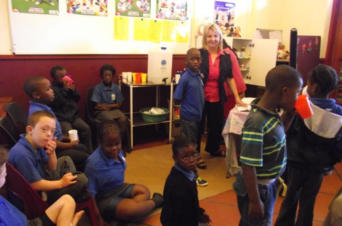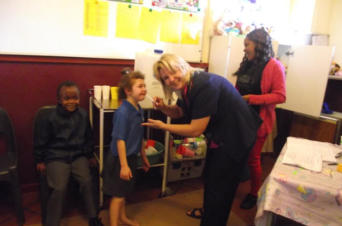

School Setup
Therapists
The Alma therapy team consists of physiotherapists and occupational
therapists. We adopt a holistic team approach and learners are always
managed within the team (Physio, OT, Teacher, Nurse, Grade HOD) to ensure
optimal development of the child. The parent and/or relevant doctors form part
of the extended team.
It is for this reason that the therapists are responsible for the admission
assessment of learners applying for space at Alma School.
Human resources, space and time is limited, and individual therapy is seldom
offered. Our therapists, however, work on time tables and use their discretion
to prioritize and plan for individual and/or group sessions.
The therapists consult with teachers on a regular basis to ensure therapy is
optimized and class recommendations are followed through. Staff in-service
training, parent evening talks and taxi-driver training sessions are arranged
regularly.
Twice a year, all therapists are involved in the corrective seating of all the
school’s learners in the classrooms. In addition, some therapists (OT and
Physio) focus on ensuring that learners who are in wheelchairs, are seated
optimally to reduce the risks of contractures and pressure sores.
All Therapists are involved in whole school development and is thus required to
perform additional tasks such as: fundraising, coaching sports, being bus
representatives, doing community outreach, assist with disability awareness
campaigns etc.
•
Physiotherapy
Alma School has physiotherapists that oversee, manage and treat our
physically disabled learners in small groups and/or for individual therapy.
Therapy is aimed at muscle strengthening, maintaining and facilitating
normal development, coordination, balance, muscle tone, range of
movement, posture and lung function.
Assistive/Mobility devices are provided by the school, for use during
school, to learners who require them. Each assistive/mobility device fits
the needs of the child. This promotes effective participation in the
classroom and other school activities.
The Physiotherapists assist with post-operative intervention,
rehabilitation and parental guidance and will work with the doctors on
recommendations and consultations where possible.
The Physiotherapists also oversee an Orthopaedic outreach clinic from
Steve Biko held once or twice a term. Alma School Physiotherapy
Department also supervises the University of Pretoria 4th year
Physiotherapy Student’s Paediatric Neurology Clinical Practical’s.
•
Occupational Therapy
Alma School has Occupational Therapists and each therapist works in a
specifically allocated Grade based on experience and expertise.
Therapy differs slightly within the Grades and in brief includes (but are
not limited to) the following:
•
Support Grade: Therapy is aimed at equipping and supporting the
teacher with individualized support for learners using AAC
methods, differentiating curriculum outcomes, sensory modulation
strategies, behaviour modification and allocating appropriate
assistive devices.
•
Grade R: Therapy is focused on sensory stimulation and the
facilitation of normal development (e.g. mastery of major
milestones, development of gross motor skills, development of
ADL skills, etc.) Therapy is mostly presented in groups and where
needed, the therapist also assists the teacher to individualize
support plans for learners. The therapist is also involved in
behaviour modification strategies and allocating appropriate
assistive devices.
•
Grade 1-3: Therapy is now mostly focused on the facilitation of
perceptual development, but refinement of the Stimulation Grade’s
outcomes is still taking place. Therapy is still mostly presented in
groups and where needed, the therapist assists the teacher to
individualize support plans for learners. The therapist stays also
involved in behaviour modification strategies and allocating
appropriate assistive devices.
•
Grade 4 & 5: In these Grades, the focus of therapy shifts towards
preparing the learners to integrate into society after school. The
therapists focus mostly on the development of independence and
appropriate social skills. The few who might be able to enter the
labour market (sheltered or protected) are prepared as best
possible (e.g. through work simulation and encouraging good work
habits and work ethics). The outcomes of all the previous Grades
are considered when making recommendations regarding a life
after school. In the year that the child turns 16, the therapists
facilitates the communication process regarding future planning
and parents are encouraged to visit different placement options
for their child. The therapists have individual consultations and
give parental guidance where needed. Due to the challenges that
the teenage years present, the therapists often provide individual
counselling and/or play therapy sessions to help learners
understand and deal with aspects such as difficult emotions,
managing conflict, basic problem solving and also dealing with
concerns about their future. The therapists stay involved in
behaviour modification strategies and ensure appropriate assistive
devices are available and used.

Clinic
School Professional Nurse
•
Sr Priscilla Bezuidenhout
•
Sr Pride Skosana
Job purpose:
•
Medical care of learners and supervising
staff in medical and related matters.
Aim / Objective:
•
Manage medical and related matters in
an effective and functional way, at the
school.
•
Supervising medical matters.
•
Care for the medical needs of the
learners.
•
Serve as member of the professional
team.
•
Training staff.
Medical Knowledge In Dealing With:
•
Epilepsy.
•
Medical emergencies in general.
•
Control of medication. Ability to function
within a professional team and to take
responsibility for medical matters.
•
Advise the staff and parents.
•
Observation of the medical condition of
learners and report to the doctors.
Training Of Staff Members In:
•
First Aid
•
HIV/AIDS
•
Epileptic fits / Emergencies
•
Cross infection
•
Hygiene
•
Medical regulations and policies
Medicine:
•
Chronic Medicine is given out to learners
on request of parents as prescribed
•
by child's medical practitioner or clinic
and recorded.
•
On written request, acute medication
supplied by parents is given at school
and recorded.
•
Emergency medicine: very basic
medicine is kept at school and
administered with parents' consent.
We have emergency medical facilities to use in
the event of medical eventualities. Basic First
Aid treatment is given by a registered nurse on
the premises. Major cases are taken to Eugene
Marais Hospital or Pretoria Academic for
emergency treatment with parents consent.





























